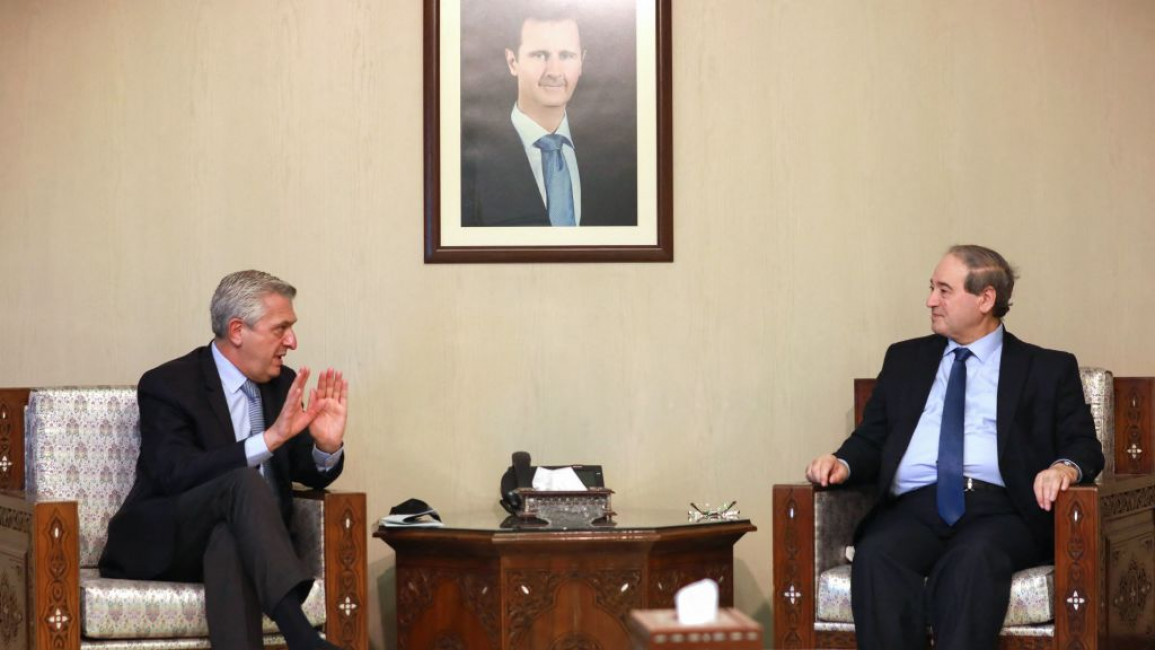UN refugee chief under fire for suggesting Syrians return to regime areas
The United Nations' High Commissioner for Refugees, Filippo Grandi, has come under fire for suggesting that the international community should work with the regime of President Bashar al-Assad to return refugees and internally displaced people returned to Syria.
Grandi visited Damascus and tweeted from there on Sunday. His tweet was accompanied by a picture of Damascus's Umayyad Mosque.
Many Syrians considered this insensitive, with some replying that if they tried to visit their homes in Syria, they would be arrested, tortured, or killed by the regime.
During his two-day visit to Syria Grandi met Syrian regime Foreign Minister Faisal Mekdad and Environment and Local Administration Minister of Local Administration and Environment Hussein Makhlouf.
Syrian activists and NGOs have repeatedly warned that Syria is not safe for refugees to return to, with Amnesty International documenting the torture, rape, and forced disappearance of refugees by regime forces.
don't you think the people of the country have more right to visit this place safely as you did? If so, don't fall for #Assad's game and know #Syria is not safe for many to return..
— Jamil Omr (@jamiiil847) October 18, 2021
In a further tweet, Grandi said, "I have discussed with the Syrian Government ways to strengthen coordination as we address internal displacement, and to cooperate in removing obstacles to the return of refugees."
He also said that he had talked with returnees in the city of Talbiseh in Homs province in central Syria.
Wafa Ali Mustafa, a Syrian activist and journalist described Grandi's visit to Syria as "shameful" and "outrageous".
"The only safe return is one that starts with getting rid of Assad's regime, prosecuting all war criminals in Syria, releasing all detainees, [and] ending the ongoing detention [and] bombardment," she wrote on Twitter.
Another Twitter user said: "As refugees, we are not safe from the oppression of this regime which is working to impoverish, starve [and] displace the people."
Amnesty International has documented a catalogue of violations committed by Syrian intelligence officers against 66 returnees, including 13 children.
In five cases, detainees had died in custody after returning to Syria, while the fate of 17 forcibly disappeared people remains unknown.
Returning refugees told Amnesty that intelligence officers explicitly targeted them for their decision to flee Syria, accusing them of disloyalty or "terrorism".
The UNHCR commented on Grandi's Syria trip on Monday issuing a statement saying: "These are Syrian nationals, and it's the government's responsibility to ensure their security."
"We are engaging with the government to highlight refugees' concerns such as their safety, property rights and livelihoods."
During the last decade, the Syrian people have experienced a brutal war with over 500,000 people being killed and 13 million forced to leave their homes, mostly as a result of regime bombardment of civilian areas.
Around 5.5 million Syrian refugees currently reside in five Middle Eastern nations.
Tens of thousands of people have also been detained in regime jails over the past decade, with many of them feared dead.
The New Arab has approached the UNHCR for comment.


![Minnesota Tim Walz is working to court Muslim voters. [Getty]](/sites/default/files/styles/image_684x385/public/2169747529.jpeg?h=a5f2f23a&itok=b63Wif2V)




![Debris near Rafic Hariri International Airport [Getty]](/sites/default/files/styles/image_212x120/public/2176162423.jpeg?h=a5f2f23a&itok=XLiO6WHk)
![An Israeli air strike on Jabalia killed teenage journalist Hassan Hamad [Screengrab/X]](/sites/default/files/styles/image_330x185/public/2024-10/hassan%20hamad1.jpg?h=c12e0b96&itok=Rd_dyCVp)
